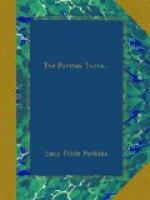She stirred the fire and lit the candles, and when the Goodman came in a few moments later, the little family looked about their new home to see what damage had been done. Nancy’s little feast was a sad wreck. There were the pies, to be sure, but the table-cloth was awry and the flowers were tipped over and strewn about the floor, which was covered with the tracks of muddy feet. In the scuffle with Zeb the spinning-wheel had been overturned and the settle was lying on its back on the floor. The room looked as if a hurricane had passed through it. The Goodman mourned the loss of his gun, and the Goodwife grieved for her tankard, but all smaller losses were forgotten in their distress about Zeb. Not only had he cost the Goodman a large sum of money, but in the weeks he had been with them he had found his own place in the household, where he would be sadly missed. Worst of all was their anxiety about his fate at the hands of the Indians.
“Come,” said the Goodwife at last, when they had heard every event of the day twice over, “we must eat, or we shall have scant courage for the duties of the morrow. We have none of us tasted food since noon.”
The clams were still simmering gently in the pot, and she gave them each a porringer of broth, which they ate sitting in a circle about the hearth-stone. Then she put the room in order, and though her heart was heavy, tried to talk of the events of their day in Boston as if nothing had happened.
[Illustration]
“We saw Captain Sanders in town,” she said to the children. “He hath brought the Lucy Ann to port with a load of cod for the market and with fish and game for Thanksgiving. I have his promise that he will dine with us if God wills. He hath not yet seen our new house. Alas! I shall have no tankard to set before him; yet, ungrateful that I am, we are still rich in blessings! ’T is well we have a day set aside to remind us of them.”
It was very late when at last the excitement had died down enough to think of sleep. The Goodman went out to make sure there was no fire left lurking in the grass, and to take a look at the horse and cow. As he passed the smoking ashes of the straw-stack, his foot struck something which rang like metal, and in the moonlight something glistened in the path before him. Stooping, he felt for it, and was overjoyed to grasp the tankard, which the Indian had lost in the struggle with Zeb. He carried it in to his wife at once. She seized it with a cry of joy.
“’T is a good omen,” she said. “Mayhap thou ’lt find thy musket too.” Her husband shook his head gravely. “I ’ll have need of one to-morrow,” he said. “’T is well I still have my fowling-piece and my pistol.” Then he called the family together and, kneeling beside the settle, committed them to God’s keeping for the night.
[Illustration]
VI
HARVEST HOME




